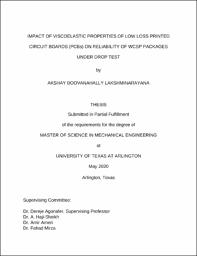
ATTENTION: The works hosted here are being migrated to a new repository that will consolidate resources, improve discoverability, and better show UTA's research impact on the global community. We will update authors as the migration progresses. Please see MavMatrix for more information.
Show simple item record
| dc.contributor.advisor | Agonafer, Dereje | |
| dc.creator | Lakshminarayana, Akshay Boovanahally | |
| dc.date.accessioned | 2021-06-03T15:36:18Z | |
| dc.date.available | 2021-06-03T15:36:18Z | |
| dc.date.created | 2020-05 | |
| dc.date.issued | 2020-06-08 | |
| dc.date.submitted | May 2020 | |
| dc.identifier.uri | http://hdl.handle.net/10106/29865 | |
| dc.description.abstract | Reliability of electronic packages is a major concern as different failure modes are induced due to factors such as temperature loads, mechanical stresses, humidity, corrosion and so on. Finite element analysis (FEA) is often performed to assess reliability under different loading conditions such as thermal cycling, drop testing, power cycling and vibrational loads. Having accurate material property data is one of the key requirements to perform successful FEA study, and a significant amount of time and money is spent to perform accurate material characterizations. Lump modeling approach, where components are represented by a block and assigned effective properties, is commonly used to model printed circuit boards (PCBs) using their elastic properties. However, previous work done by Liu et. al. has shown that viscoelastic properties of PCBs have a direct influence on dynamic characteristics of PCBs under drop impact. In this paper, the viscoelastic properties of PCBs made of low loss materials are characterized and used in finite element analysis to study reliability of wafer level chip scale packages (WCSP) under drop testing conditions. The Wafer-level packaging is one of the advanced modern-day packaging techniques that is popular because it is lighter, smaller and less expensive. Low loss materials are used for high frequency applications as they provide improved electrical performance and have low dielectric constant. Dynamic mechanical analysis (DMA) measurements are done on PCBs made of Megtron-6 6 (a type of low loss materials) for multiple frequencies and results are used to obtain a master curve for the complex modulus over a wide range of frequency. The master curve is used to obtain Prony series constants that are used in ANSYS Mechanical to perform reliability analysis under drop testing conditions. Using a JEDEC standard, an acceleration pulse of 1500G was applied for a duration of 0.5 ms. The FEA results are used to compare the two cases where PCBs are modeled with and without the inclusion of viscoelastic properties. Results from the FEA simulations are observed to compare deformation, normal strain, total acceleration of the package with and without viscoelastic properties. | |
| dc.format.mimetype | application/pdf | |
| dc.language.iso | en_US | |
| dc.subject | Viscoelastic modeling | |
| dc.subject | DMA | |
| dc.subject | TMA | |
| dc.subject | Master curve | |
| dc.title | IMPACT OF VISCOELASTIC PROPERTIES OF LOW LOSS PRINTED CIRCUIT BOARDS (PCBs) ON RELIABILITY OF WCSP PACKAGES UNDER DROP TEST | |
| dc.type | Thesis | |
| dc.contributor.committeeMember | Haji-Sheikh, Abdolhossein | |
| dc.contributor.committeeMember | Ameri, Amir | |
| dc.contributor.committeeMember | Mirza, Fahad | |
| dc.degree.department | Mechanical and Aerospace Engineering | |
| dc.degree.name | Master of Science in Mechanical Engineering | |
| dc.date.updated | 2021-06-03T15:36:19Z | |
| thesis.degree.department | Mechanical and Aerospace Engineering | |
| thesis.degree.grantor | The University of Texas at Arlington | |
| thesis.degree.level | Masters | |
| thesis.degree.name | Master of Science in Mechanical Engineering | |
| dc.type.material | text | |
Files in this item
- Name:
- LAKSHMINARAYANA-THESIS-2020.pdf
- Size:
- 1.367Mb
- Format:
- PDF
This item appears in the following Collection(s)
Show simple item record


